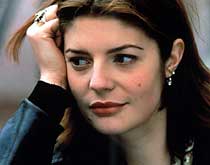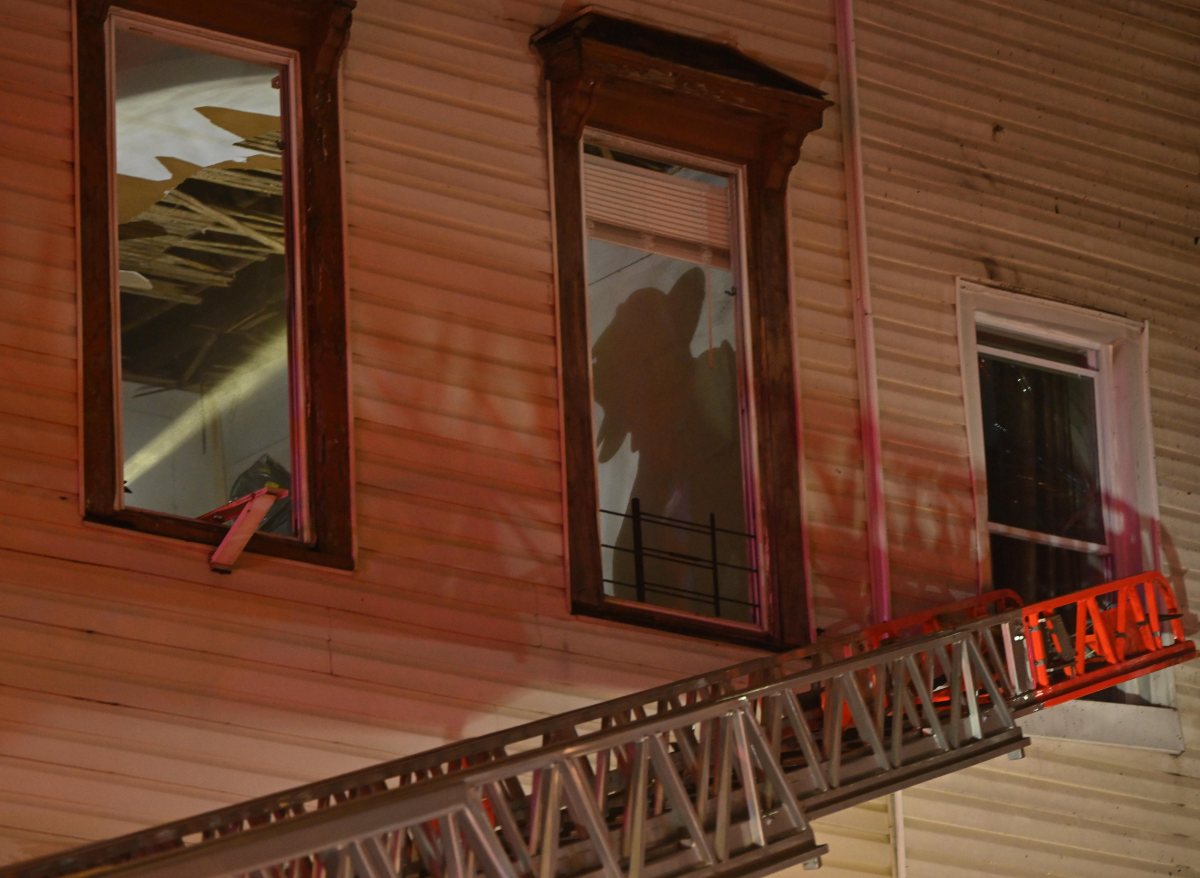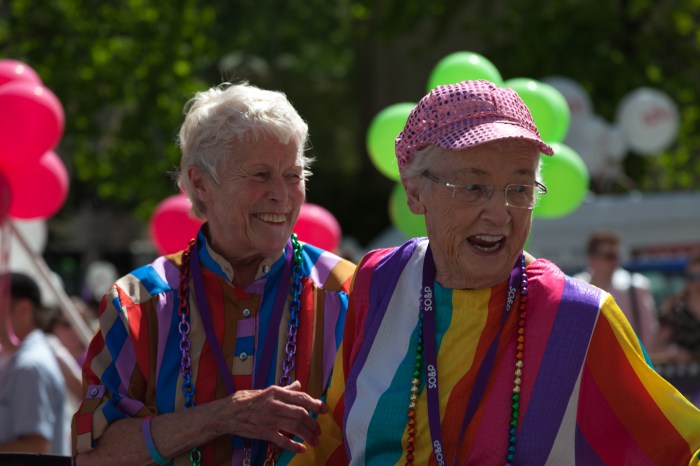Can you tell the gender of a movie director
just by watching a film?
Such a question, in one form or another, is unavoidable when
commenting on "Films de Femmes: Female French Directors,"
an 11-film series showcasing the prominence of women behind the
camera in recent Gallic cinema. The series runs April 15-27 at
BAM Rose Cinemas.
The answer, not surprisingly, is maybe. When comparing these
works to the aggressive gimmickry of Hollywood, it is tempting
to attribute their sensitivity to some sort of "woman’s
touch," particularly since all the femmes double as their
own screenwriters. But if you stripped off the credits, you would
be hard-pressed to guess the chromosomal makeup of the filmmakers.
The meticulous analysis of emotion and relationships, and the
preoccupation with the domestic and the quotidian, are longstanding
characteristics of what might be called the "French touch."
That said, a couple of the directors unabashedly take on a subject
avoided by most male storytellers, the panic and confusion of
repressed homoeroticism. The essentials of Anne Fontaine’s absorbing
"Dry Cleaning" (1997; screening April 15) are nothing
new: alluring/ threatening stranger insinuates himself into life
of staid couple; relationship fault lines are exposed, bourgeois
masks ripped away; emotions snowball out of control in a vaguely
Hitchcockian fashion.
Fontaine and her actors keep the material out of a rut through
moment-to-moment nuance, never more so than in one expertly discomfiting
scene where the androgynous young drifter comes on to the husband.
The tension, sexual and otherwise, tingles on the viewer’s skin
like a flush of intense embarrassment – and plants the seed for
an ending that questions who is most dangerous in this scenario.
Bolder in conception but bumpier in execution, "Beau Travail"
(1999; April 23), by Claire Denis, is set in a conspicuously
male world: an isolated Foreign Legion outpost in the North African
desert, where the sergeant, jealous over the commanding officer’s
attention, conceives an irrational hatred for a magnetic, model
recruit.
Unfortunately, Denis shows little interest in the sociology of
this unique community, opting instead for frustrating abstraction.
In strikingly shot but interminable sequences, the buff-bodied
soldiers train beneath the sizzling sun in formal, almost dancelike
routines. Drama is replaced by the monotonous voiceover rambling
of Denis Lavant as the obsessed sergeant. For most critics, this
adds up to the one of the great films of the ’90s. For this writer,
it’s one of the most overrated.
Gay panic doesn’t really bother the young man played hilariously
by Mathieu Amalric, French film’s current favorite icon of confused
youth, in Danièle Dubroux’s "Diary of a Seducer"
(1995; April 25). But he believes that pretending so will help
him win over a young woman (Chiara Mastroianni, daughter of French
legend Catherine Deneuve and Italian legend Marcelo Mastroianni).
As he fakes anguish over his sexual orientation, he is oblivious
to a more sincere rival’s almost effortless success with the
object of his desire. Dubroux lays on the dark-comic machinations
a little thick, even resorting to gratuitous corpse disposal
farce. But this restating of a deathless theme, romantic self-delusion,
is generally droll, charming and even insightful.
Multiply that by 10 for writer-actress Agnès Jaoui’s directing
debut, "The Taste of Others" (2000; April 26). Co-authored
with Jaoui’s longtime writing-acting partner, Jean-Pierre Bacri,
this romantic comedy spurns the usual cutesy artifice for bittersweet
wit. The irresistible Bacri anchors the ensemble cast, as a dull,
married businessman who is smitten with a stage actress and horns
in on her art-world circle – prompting surprising life reassessments
for both. Comparable intersections occur among the characters
orbiting around them, notably a pot-dealing bartender-waitress
(played by the radiant Jaoui) who takes up with a straitlaced
ex-cop. The principal theme is how personal tastes inform and
erode personal relationships, but you might have too much fun
to notice until it’s over.
Tonie Marshall’s "Venus Beauty Institute" (1998; April
17) similarly takes what feels like a romantic comedy setup and
turns it to deeper uses. Veteran actress Nathalie Baye plays
an attractive but lonely and emotionally brittle fortysomething,
annoyed and intrigued by a younger man’s sudden infatuation.
The majority of the film plays out in the titular establishment
where Baye works, scathingly observing female and male obsessions
with surface appearance – and by extension, the masochism of
fairytale romantic notions. Marshall dances fearlessly on the
edge of such myths. It’s a surprising film, at once swooning
and cynical.
There’s little cynicism or sentimentality in Sandrine Veysset’s
"Will It Snow for Christmas?" (1996; April 22). Little
plot either, just the day-to-day lives of an unmarried mother
and her seven children on a rural farm, where they toil for the
children’s father. The film’s greatest pleasure is the tough
but joyous devotion binding the heroine to her brood, each of
whom is an enchanting, full-blooded character.
Veysset refuses to either gloss over or judge the mother’s guilt-ridden
inability to tear herself and her family from the clutches of
the psychologically abusive lover/patriarch. Such a short description
does an injustice to a movie so tender, fierce and gloriously
alive. Even though not all of the "Films de Femmes"
were available for review, "Will It Snow" seems unbeatable
as the best of the pack.
The strangest and most troubling, though, is Laetitia Masson’s
"For Sale" (1998; April 18), which deconstructs that
very "masculine" genre, the detective film. The story
begins with a private eye, complete with glum voiceover narration,
hired to track down a jilted friend’s runaway bride. Interwoven
with the pursuit, flashbacks reveal the sordid, self-destructive
sexual history of the young woman (the odd and enthralling Sandrine
Kiberlain). It’s like getting the neglected backstory for one
of those frigid femmes fatales of mystery fiction.
It also indirectly exposes, to himself and to the audience, the
detective’s own dysfunction and misogyny. The conceit sometimes
seems in danger of derailing – Masson straddles, and occasionally
gets stuck on, the fence between naturalism and arty stylization.
It is powerful stuff, all the same.
If there’s one telltale sign that all the movies were made by
women, it’s their vast gallery of rounded, complex female characters.
These filmmakers refuse to create stereotypes, or perhaps it
never occurs to them in the first place.
"Films de Femmes: Female French Directors" will run
April 15-27 at BAM Rose Cinemas, 30 Lafayette Ave. at Ashland
Place in Fort Greene. Tickets are $10, and on weekdays, $7 for
students with I.D. and $6 for seniors and children under 12.
A panel discussion will follow the 7 pm screening of "Dry
Cleaning" on April 15. For schedule and other information,
call (718) 636-4100 or log on to www.bam.org.




















